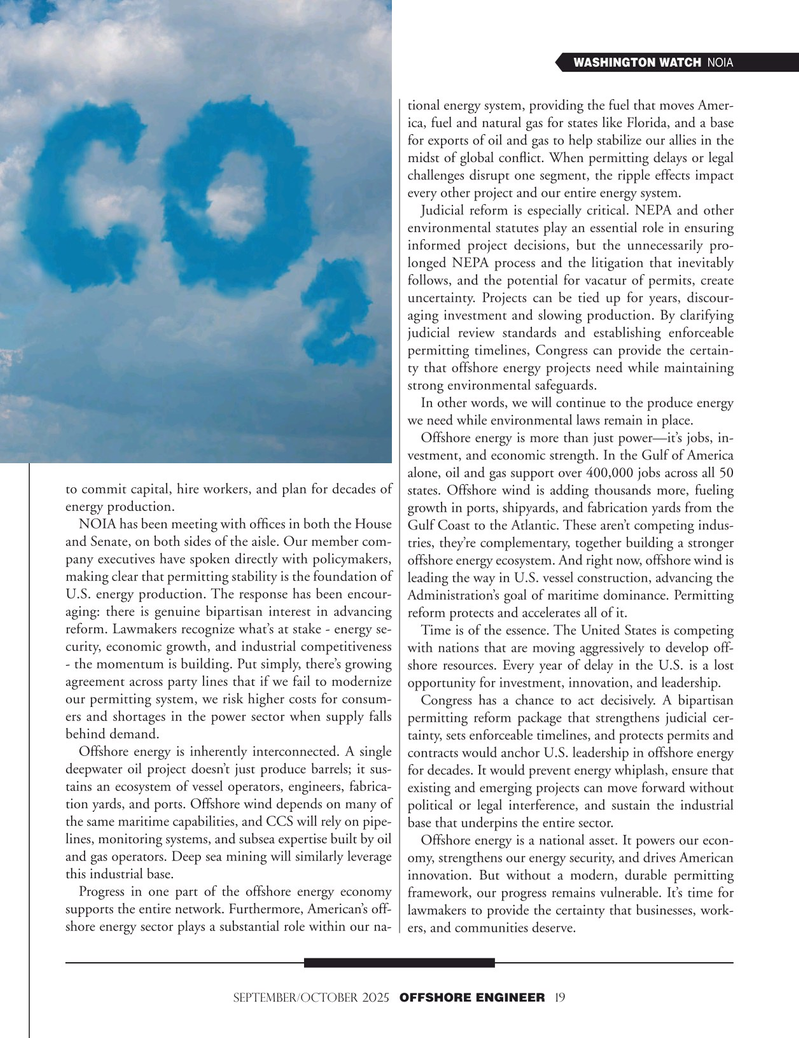
Page 19: of Offshore Engineer Magazine (Sep/Oct 2025)
Read this page in Pdf, Flash or Html5 edition of Sep/Oct 2025 Offshore Engineer Magazine
WASHINGTON WATCH NOIA tional energy system, providing the fuel that moves Amer- ica, fuel and natural gas for states like Florida, and a base for exports of oil and gas to help stabilize our allies in the midst of global confict. When permitting delays or legal challenges disrupt one segment, the ripple effects impact every other project and our entire energy system.
Judicial reform is especially critical. NEPA and other environmental statutes play an essential role in ensuring informed project decisions, but the unnecessarily pro- longed NEPA process and the litigation that inevitably follows, and the potential for vacatur of permits, create uncertainty. Projects can be tied up for years, discour- aging investment and slowing production. By clarifying judicial review standards and establishing enforceable permitting timelines, Congress can provide the certain- ty that offshore energy projects need while maintaining strong environmental safeguards.
In other words, we will continue to the produce energy we need while environmental laws remain in place.
Offshore energy is more than just power—it’s jobs, in- vestment, and economic strength. In the Gulf of America alone, oil and gas support over 400,000 jobs across all 50 to commit capital, hire workers, and plan for decades of states. Offshore wind is adding thousands more, fueling energy production. growth in ports, shipyards, and fabrication yards from the
NOIA has been meeting with offces in both the House Gulf Coast to the Atlantic. These aren’t competing indus- and Senate, on both sides of the aisle. Our member com- tries, they’re complementary, together building a stronger pany executives have spoken directly with policymakers, offshore energy ecosystem. And right now, offshore wind is making clear that permitting stability is the foundation of leading the way in U.S. vessel construction, advancing the
U.S. energy production. The response has been encour- Administration’s goal of maritime dominance. Permitting aging: there is genuine bipartisan interest in advancing reform protects and accelerates all of it.
reform. Lawmakers recognize what’s at stake - energy se- Time is of the essence. The United States is competing curity, economic growth, and industrial competitiveness with nations that are moving aggressively to develop off- - the momentum is building. Put simply, there’s growing shore resources. Every year of delay in the U.S. is a lost agreement across party lines that if we fail to modernize opportunity for investment, innovation, and leadership.
our permitting system, we risk higher costs for consum- Congress has a chance to act decisively. A bipartisan ers and shortages in the power sector when supply falls permitting reform package that strengthens judicial cer- behind demand. tainty, sets enforceable timelines, and protects permits and
Offshore energy is inherently interconnected. A single contracts would anchor U.S. leadership in offshore energy deepwater oil project doesn’t just produce barrels; it sus- for decades. It would prevent energy whiplash, ensure that tains an ecosystem of vessel operators, engineers, fabrica- existing and emerging projects can move forward without tion yards, and ports. Offshore wind depends on many of political or legal interference, and sustain the industrial the same maritime capabilities, and CCS will rely on pipe- base that underpins the entire sector.
lines, monitoring systems, and subsea expertise built by oil Offshore energy is a national asset. It powers our econ- and gas operators. Deep sea mining will similarly leverage omy, strengthens our energy security, and drives American this industrial base. innovation. But without a modern, durable permitting
Progress in one part of the offshore energy economy framework, our progress remains vulnerable. It’s time for supports the entire network. Furthermore, American’s off- lawmakers to provide the certainty that businesses, work- shore energy sector plays a substantial role within our na- ers, and communities deserve.
SEPTEMBER/OCTOBER 2025 OFFSHORE ENGINEER 19

 18
18

 20
20